外研(新标准)版七年级下Module 1 Lost and found Unit 2 Are they yours?课件(34张PPT)
文档属性
| 名称 | 外研(新标准)版七年级下Module 1 Lost and found Unit 2 Are they yours?课件(34张PPT) | 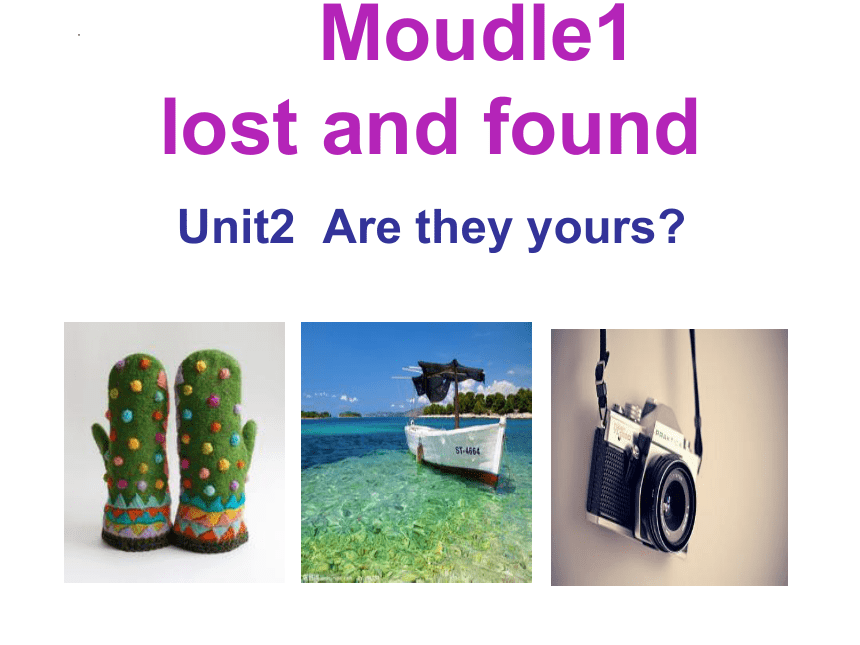 | |
| 格式 | pptx | ||
| 文件大小 | 1.9MB | ||
| 资源类型 | 教案 | ||
| 版本资源 | 外研版 | ||
| 科目 | 英语 | ||
| 更新时间 | 2022-04-06 16:23:16 | ||
图片预览

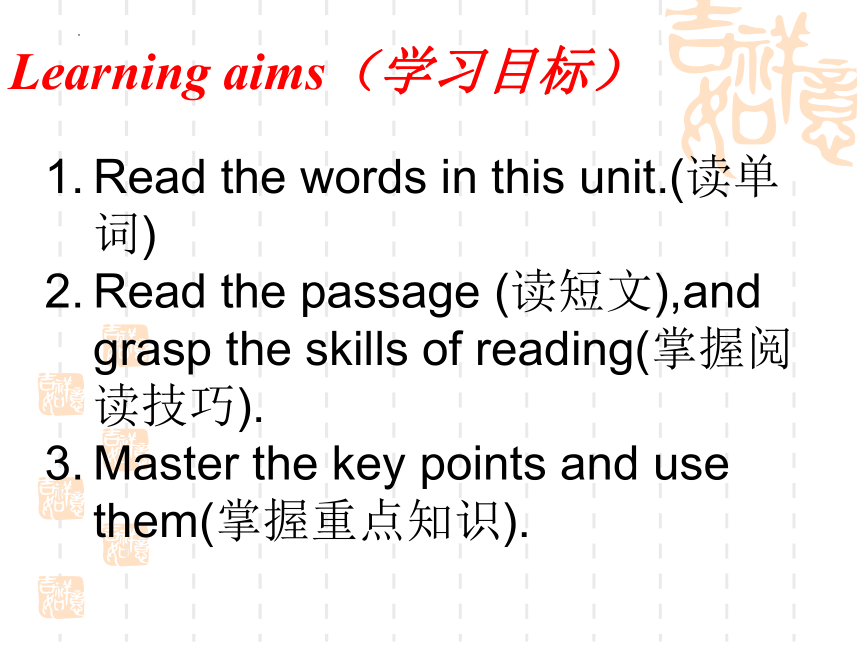

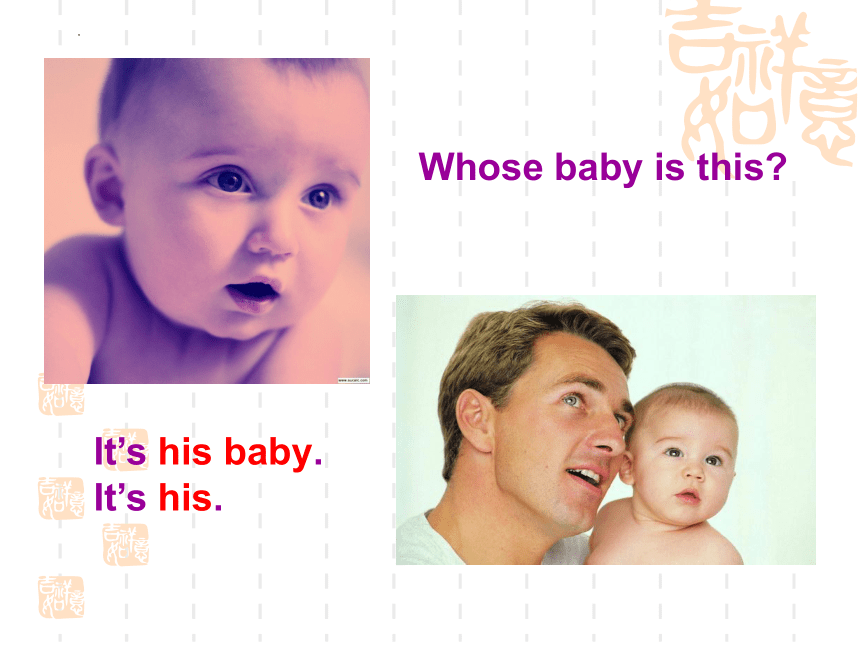


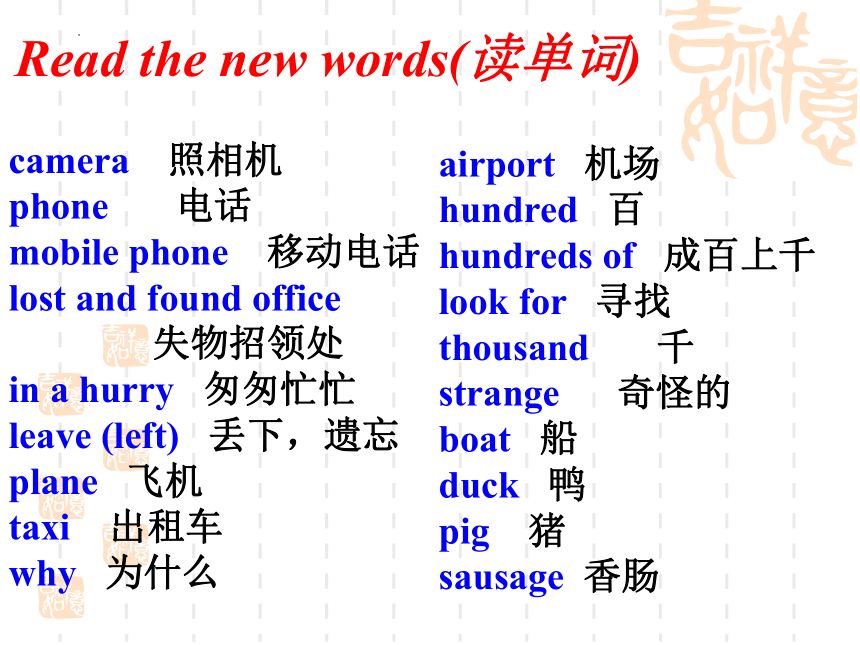
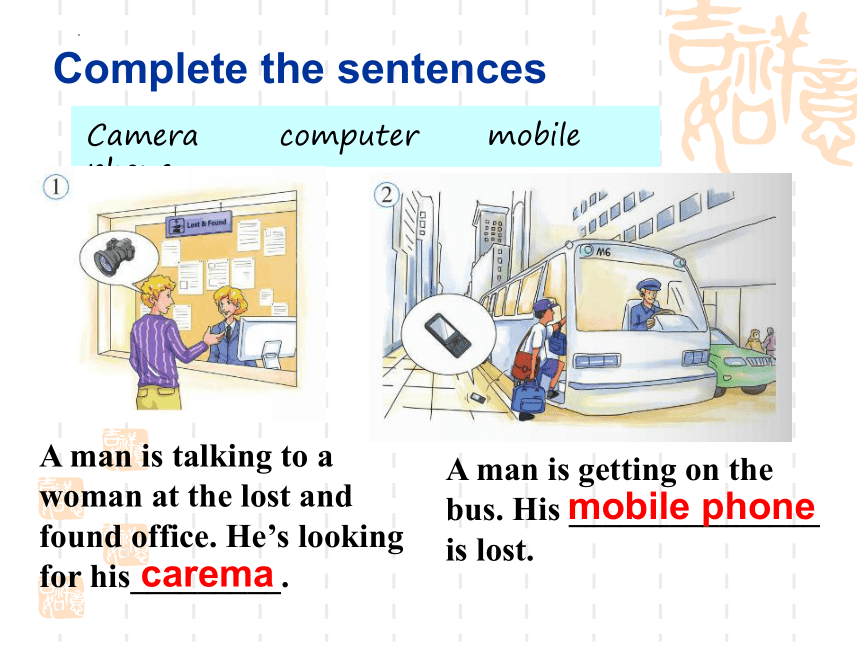
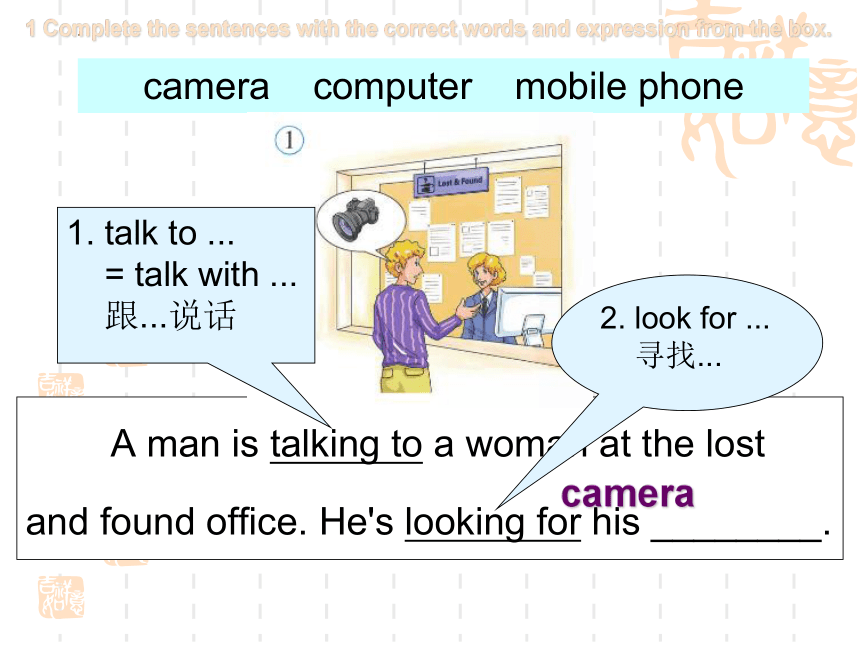
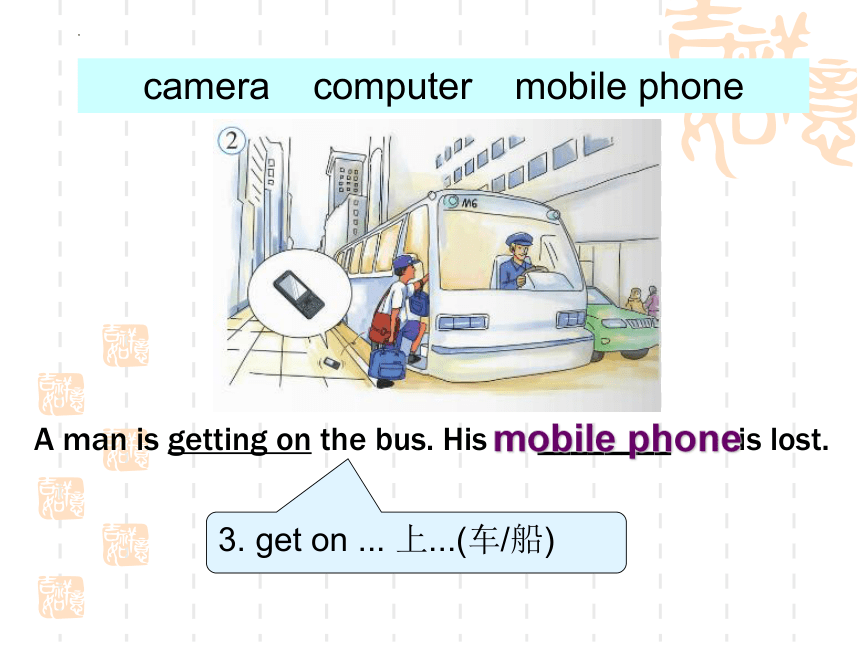
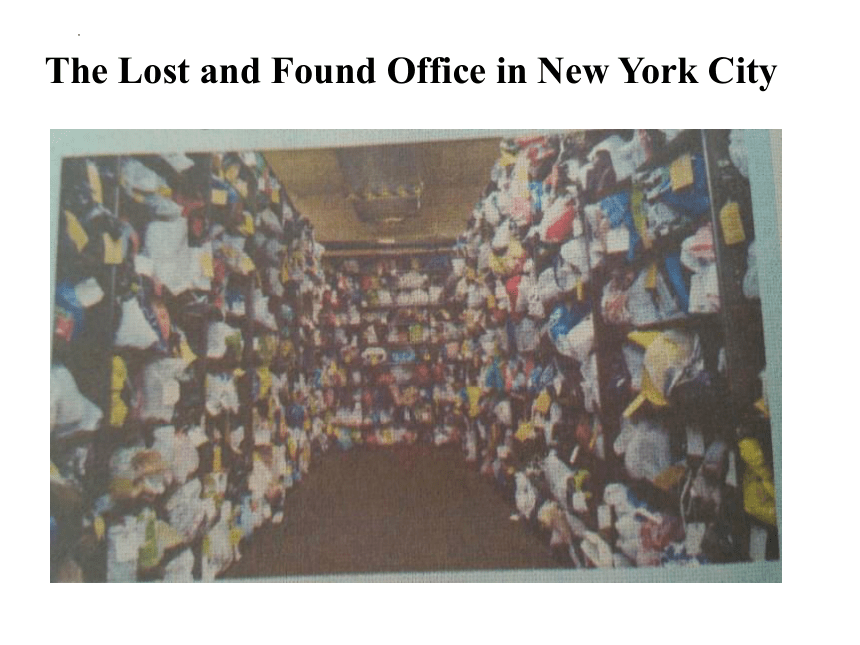
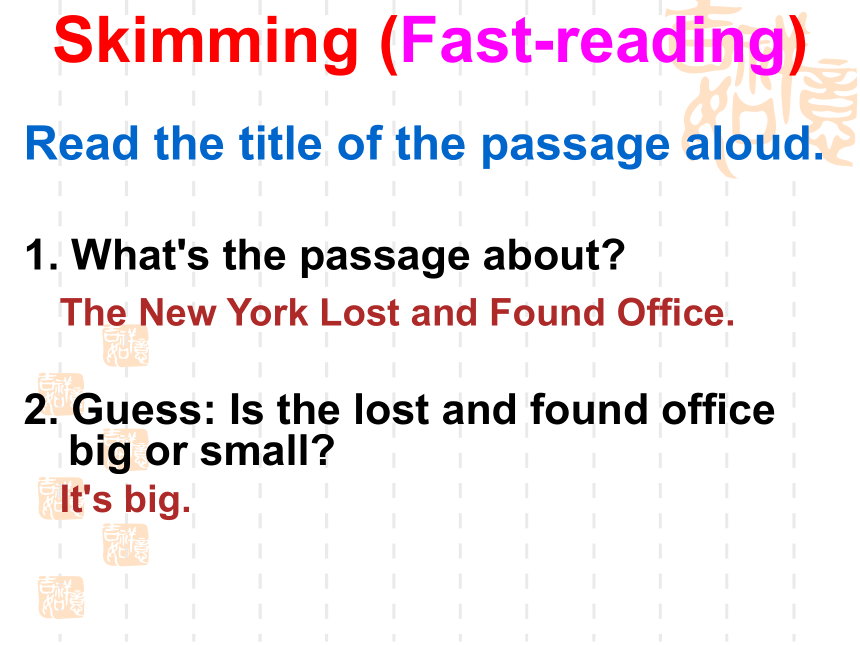
文档简介
(共34张PPT)
Moudle1
lost and found
Unit2 Are they yours
Learning aims(学习目标)
Read the words in this unit.(读单词)
Read the passage (读短文),and grasp the skills of reading(掌握阅读技巧).
Master the key points and use them(掌握重点知识).
Whose cat is this
It’s her cat.
It’s hers.
Revision
Whose baby is this
It’s his baby.
It’s his.
Whose schoolbags
are these
They are our schoolbags.
They are ours.
说出下列形容词性物主代词相应的名词性物主代词:
my
your
his
her
its
________
________
________
________
________
our
your
their
________
________
________
mine
yours
his
hers
its
ours
yours
theirs
Read the new words(读单词)
camera 照相机
phone 电话
mobile phone 移动电话
lost and found office
失物招领处
in a hurry 匆匆忙忙
leave (left) 丢下,遗忘
plane 飞机
taxi 出租车
why 为什么
airport 机场
hundred 百
hundreds of 成百上千
look for 寻找
thousand 千
strange 奇怪的
boat 船
duck 鸭
pig 猪
sausage 香肠
Complete the sentences
Camera computer mobile phone
A man is talking to a woman at the lost and found office. He’s looking for his_________.
A man is getting on the bus. His _______________ is lost.
carema
mobile phone
A man is talking to a woman at the lost
and found office. He's looking for his ________.
1 Complete the sentences with the correct words and expression from the box.
camera computer mobile phone
camera
1. talk to ...
= talk with ...
跟...说话
2. look for ...
寻找...
A man is getting on the bus. His ________ is lost.
camera computer mobile phone
mobile phone
3. get on ... 上...(车/船)
The Lost and Found Office in New York City
Skimming (Fast-reading)
Read the title of the passage aloud.
1. What's the passage about
2. Guess: Is the lost and found office big or small
The New York Lost and Found Office.
It's big.
Read the passage:读课文,回答下列问题
1.When do people often lose things
2. Where do they leave things
3. How many people come to the New York City Lost and Found Office
4. Are there any animals in the Lost and Found office
1.---When do people often lose things
---People often lose things when they are travelling or when they are in a hurry.
2. ---Where do they leave things
---They leave things on planes, on trains, on buses and in taxis.
3. ---How many people come to the New York City Lost and Found Office
---Hundreds of people come here every day.
4. ---Are there any animals in the Lost and Found office
---Yes, there are.
Read and check the sentences.
1. People often leave things on planes, on
trains, on buses and in taxis.
2. All left things can find in the New York
City Lost and Found office.
3. A hundred bikes and a large boat are left
in the New York City Lost and Found
office.
4. There are two dogs, two ducks and a pig
are left in the New York City Lost and
Found office this week.
√
×
√
×
Careful reading
Not all
three
Welcome to the New York City________________. People often lose things when they're ________or when they're________. They ______things on planes, on trains, on buses and ___taxis. _________there are lost and found offices at airports and stations.
The New York City Lost and Found Office is very big. ____________people come here every day. They are _________ their phones, cameras, watches, computers and__________. We usually have about __________mobile phones and one thousand cameras.
__________, there are also some _______things at the New York and Found Office. There are about a hundred bikes and a large boat. There are also __________animals.
This week, there are three dogs, _______and a pig! Whose are they Are they yours We don't know! Are you looking for _______________sausages They're here too!
Lost and Found Office
travelling
in a hurry
leave
in
That's why
Hundreds of
looking for
many other things
two thousand
At the moment
strange
a lot of
fifteen kilos of
two ducks
Language points:
1.People often lose things when they’re travelling or when they’re in a hurry.
in a hurry “匆匆忙忙”
They are in a hurry to go to the party.
他们匆匆忙忙地去参加聚会。
2.They leave things on planes, on trains, on buses and in taxis.
leave sth. +地点 “在某地落下某物”
I often leave my book at home.
我常常把书留在家里 。
3.Hundreds of people come here every day.
hundreds of +名词复数 “数百的,成百上千”
hundreds of teachers 好多老师
hundreds of books 数百本书
基数词+hundred + 名词复数
one hundred students 一百个学生
five hundred books 五百本书
4.That’s why there are lost and found offices at airports and stations.
That’s why… “那就是….的原因”
That’s why I come.那就是我来的原因。
That’s why I like you.那就是我喜欢你的原因。
5. They are looking for their phones, cameras, watches, computers and many other things.
look for “寻找”指有目的的找,强调“找的动作”。
find “找到,发现”, 强调“找的结果”.
I’m looking for my bag, but I can’t find it.
我找我的书包,但我没找到。
many other things. 许多其他的东西
一、翻译句子:
当人们旅行时经常丢东西。
People often ________ things when______________
2. 大明很匆忙地去上学。
Daming goes to school _________.
3. 成百上千的人们来到这里。
__________ ______ people come here.
4. 你正在寻找你的手机吗?
Are you _______ ____ your mobile phone
5.那就是他喜欢你的原因。
______ _____ he likes you.
6.这家动物园有三百只猴子。
There are ______ ______ monkeys in this zoo.
lose
they’re travelling.
in a hurry
Hundreds of
looking for
That’s why
Practice:练一练
three hundred
We are the winners!
Read the passage loudly :
People in a hurry often (1) ______ things, and there are (2) _________ things at lost and found offices at (3) _______ and (4) ________. At the New York City and Found Office, there are also some very (5) _________ things. There are fifteen kilos of (6) _______--- are they yours And how do you lose a (7) ______ boat on a train
Complete the passage with the correct form.
airport hundreds of large lose
sausage station strange
lose
hundreds of
airports
station
strange
sausage
large
4.Writing – read the lost and found notes and write.
Lost
My gloves.
They’re blue and
white. Call Tony at
8574 9326.
Found
Is this your bag
Call Betty at 2369
0390.
6.call v.打电话
call sb. 给······打电话
call + 某人 + at +电话号码(用这个号码打电话给某人)
Please call John at 035-7328. 请打0357328找约翰。
call还可以表示“称呼”。
They call me Tina.
1. 打电话235-0285找珍妮。
____________________________
2. 打电话685-6034找托尼。
___
Call Jenny at 235-0285.
Call Tony at 685-6034.
A Possible Version
Lost
A blue wallet.
At school.
Call Lingling at XXX.
Found
Is this your red bag
Found at the station.
Call Li at XXX.
重点词组:
1. talk to ... = talk with ... 跟...说话
2. look for ... 寻找...
3. get on ... 上...(车/船)
4. be in a hurry 匆匆忙忙
5. “leave 某物 某地” 把某物遗忘/遗留在某地
6. That's why ... 那就是为什么...
7. hundreds of ... 成百的...
8. many other things 许多其他的东西
9. about 大约
10. at the moment 此刻
11. a kilo of ... 一公斤...
1. Is this your eraser
________________
2. It’s not mine.
________________
3. Are these your boxes
___________________
4. They are not mine.
___________________
Is this eraser yours
It’s not my eraser.
Are these boxes yours?
They are not my boxes.
句型转换:
1. 大部分形容词性物主代词在后面加 “s”构成名词
性物主代词.有3个特殊情况:
my—mine, his— his, its—its。
2. 形容词性物主代词与名词性物主代词的区别:
前者有名词的含义,后面需跟名词;后者可单独使用,相当于对应的形容词性物主代词加名词。
3. 名词性物主代词作主语时,如果含义是单数,后面的be动词用is;如果含义是复数,那么be动词用are。
Summary
Thank You !
Moudle1
lost and found
Unit2 Are they yours
Learning aims(学习目标)
Read the words in this unit.(读单词)
Read the passage (读短文),and grasp the skills of reading(掌握阅读技巧).
Master the key points and use them(掌握重点知识).
Whose cat is this
It’s her cat.
It’s hers.
Revision
Whose baby is this
It’s his baby.
It’s his.
Whose schoolbags
are these
They are our schoolbags.
They are ours.
说出下列形容词性物主代词相应的名词性物主代词:
my
your
his
her
its
________
________
________
________
________
our
your
their
________
________
________
mine
yours
his
hers
its
ours
yours
theirs
Read the new words(读单词)
camera 照相机
phone 电话
mobile phone 移动电话
lost and found office
失物招领处
in a hurry 匆匆忙忙
leave (left) 丢下,遗忘
plane 飞机
taxi 出租车
why 为什么
airport 机场
hundred 百
hundreds of 成百上千
look for 寻找
thousand 千
strange 奇怪的
boat 船
duck 鸭
pig 猪
sausage 香肠
Complete the sentences
Camera computer mobile phone
A man is talking to a woman at the lost and found office. He’s looking for his_________.
A man is getting on the bus. His _______________ is lost.
carema
mobile phone
A man is talking to a woman at the lost
and found office. He's looking for his ________.
1 Complete the sentences with the correct words and expression from the box.
camera computer mobile phone
camera
1. talk to ...
= talk with ...
跟...说话
2. look for ...
寻找...
A man is getting on the bus. His ________ is lost.
camera computer mobile phone
mobile phone
3. get on ... 上...(车/船)
The Lost and Found Office in New York City
Skimming (Fast-reading)
Read the title of the passage aloud.
1. What's the passage about
2. Guess: Is the lost and found office big or small
The New York Lost and Found Office.
It's big.
Read the passage:读课文,回答下列问题
1.When do people often lose things
2. Where do they leave things
3. How many people come to the New York City Lost and Found Office
4. Are there any animals in the Lost and Found office
1.---When do people often lose things
---People often lose things when they are travelling or when they are in a hurry.
2. ---Where do they leave things
---They leave things on planes, on trains, on buses and in taxis.
3. ---How many people come to the New York City Lost and Found Office
---Hundreds of people come here every day.
4. ---Are there any animals in the Lost and Found office
---Yes, there are.
Read and check the sentences.
1. People often leave things on planes, on
trains, on buses and in taxis.
2. All left things can find in the New York
City Lost and Found office.
3. A hundred bikes and a large boat are left
in the New York City Lost and Found
office.
4. There are two dogs, two ducks and a pig
are left in the New York City Lost and
Found office this week.
√
×
√
×
Careful reading
Not all
three
Welcome to the New York City________________. People often lose things when they're ________or when they're________. They ______things on planes, on trains, on buses and ___taxis. _________there are lost and found offices at airports and stations.
The New York City Lost and Found Office is very big. ____________people come here every day. They are _________ their phones, cameras, watches, computers and__________. We usually have about __________mobile phones and one thousand cameras.
__________, there are also some _______things at the New York and Found Office. There are about a hundred bikes and a large boat. There are also __________animals.
This week, there are three dogs, _______and a pig! Whose are they Are they yours We don't know! Are you looking for _______________sausages They're here too!
Lost and Found Office
travelling
in a hurry
leave
in
That's why
Hundreds of
looking for
many other things
two thousand
At the moment
strange
a lot of
fifteen kilos of
two ducks
Language points:
1.People often lose things when they’re travelling or when they’re in a hurry.
in a hurry “匆匆忙忙”
They are in a hurry to go to the party.
他们匆匆忙忙地去参加聚会。
2.They leave things on planes, on trains, on buses and in taxis.
leave sth. +地点 “在某地落下某物”
I often leave my book at home.
我常常把书留在家里 。
3.Hundreds of people come here every day.
hundreds of +名词复数 “数百的,成百上千”
hundreds of teachers 好多老师
hundreds of books 数百本书
基数词+hundred + 名词复数
one hundred students 一百个学生
five hundred books 五百本书
4.That’s why there are lost and found offices at airports and stations.
That’s why… “那就是….的原因”
That’s why I come.那就是我来的原因。
That’s why I like you.那就是我喜欢你的原因。
5. They are looking for their phones, cameras, watches, computers and many other things.
look for “寻找”指有目的的找,强调“找的动作”。
find “找到,发现”, 强调“找的结果”.
I’m looking for my bag, but I can’t find it.
我找我的书包,但我没找到。
many other things. 许多其他的东西
一、翻译句子:
当人们旅行时经常丢东西。
People often ________ things when______________
2. 大明很匆忙地去上学。
Daming goes to school _________.
3. 成百上千的人们来到这里。
__________ ______ people come here.
4. 你正在寻找你的手机吗?
Are you _______ ____ your mobile phone
5.那就是他喜欢你的原因。
______ _____ he likes you.
6.这家动物园有三百只猴子。
There are ______ ______ monkeys in this zoo.
lose
they’re travelling.
in a hurry
Hundreds of
looking for
That’s why
Practice:练一练
three hundred
We are the winners!
Read the passage loudly :
People in a hurry often (1) ______ things, and there are (2) _________ things at lost and found offices at (3) _______ and (4) ________. At the New York City and Found Office, there are also some very (5) _________ things. There are fifteen kilos of (6) _______--- are they yours And how do you lose a (7) ______ boat on a train
Complete the passage with the correct form.
airport hundreds of large lose
sausage station strange
lose
hundreds of
airports
station
strange
sausage
large
4.Writing – read the lost and found notes and write.
Lost
My gloves.
They’re blue and
white. Call Tony at
8574 9326.
Found
Is this your bag
Call Betty at 2369
0390.
6.call v.打电话
call sb. 给······打电话
call + 某人 + at +电话号码(用这个号码打电话给某人)
Please call John at 035-7328. 请打0357328找约翰。
call还可以表示“称呼”。
They call me Tina.
1. 打电话235-0285找珍妮。
____________________________
2. 打电话685-6034找托尼。
___
Call Jenny at 235-0285.
Call Tony at 685-6034.
A Possible Version
Lost
A blue wallet.
At school.
Call Lingling at XXX.
Found
Is this your red bag
Found at the station.
Call Li at XXX.
重点词组:
1. talk to ... = talk with ... 跟...说话
2. look for ... 寻找...
3. get on ... 上...(车/船)
4. be in a hurry 匆匆忙忙
5. “leave 某物 某地” 把某物遗忘/遗留在某地
6. That's why ... 那就是为什么...
7. hundreds of ... 成百的...
8. many other things 许多其他的东西
9. about 大约
10. at the moment 此刻
11. a kilo of ... 一公斤...
1. Is this your eraser
________________
2. It’s not mine.
________________
3. Are these your boxes
___________________
4. They are not mine.
___________________
Is this eraser yours
It’s not my eraser.
Are these boxes yours?
They are not my boxes.
句型转换:
1. 大部分形容词性物主代词在后面加 “s”构成名词
性物主代词.有3个特殊情况:
my—mine, his— his, its—its。
2. 形容词性物主代词与名词性物主代词的区别:
前者有名词的含义,后面需跟名词;后者可单独使用,相当于对应的形容词性物主代词加名词。
3. 名词性物主代词作主语时,如果含义是单数,后面的be动词用is;如果含义是复数,那么be动词用are。
Summary
Thank You !
同课章节目录
- Module 1 Lost and found
- Unit 1 Whose bag is this?
- Unit 2 Are they yours?
- Unit 3 Language in use
- Module 2 What can you do ?
- Unit 1 I can play the piano
- Unit 2 I can run really fast
- Unit 3 Language in use
- Module 3 Making plans
- Unit 1 What are you going to do at the weekends?
- Unit 2 We're going to cheer the players.
- Unit 3 Language in use
- Module 4 Life in the future
- Unit 1 Everyone will study at home
- Unit 2 Every family will have a small plane.
- Unit 3 Language in use
- Module 5 Shopping
- Unit 1 What can I do for you?
- Unit 2 You can buy everything on the Internet
- Unit 3 Language in use
- Module 6 Around town
- Unit 1 Could you tell me how to get to the Nationa
- Unit 2 The London Eye is on your right.
- Unit 3 Language in use
- Revision module A
- Module 7 My past life
- Unit 1 I was born in a small village.
- Unit 2 I was born in Quincy.
- Unit 3 Language in use
- Module 8 Story time
- Unit 1 Once upon a time….
- Unit 2 Goldilocks hurried out of the house.
- Unit 3 Language in use
- Module 9 Life history
- Unit 1 He left school and began work at the age of
- Unit 2 He decided to be an actor.
- Unit 3 Language in use
- Module 10 A holiday journey
- Unit 1 What did you do?
- Unit 2 This morning we took a walk.
- Unit 3 Language in use
- Module 11 Body language
- Unit 1 They touch noses!
- Unit 2 Here are some ways to welcome them.
- Unit 3 Language in use
- Module 12 Western music
- Unit 1 It's so beautiful!
- Unit 2 Vienna is the centre of European classical
- Unit 3 Language in use
- Revision module B
